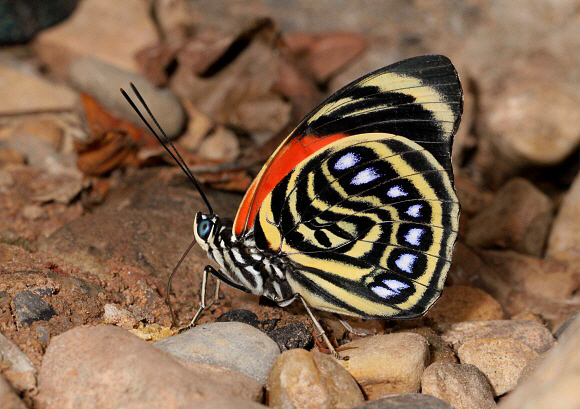 Agrias amydon amydonius, Satipo, Peru – Adrian Hoskins
Agrias amydon amydonius, Satipo, Peru – Adrian Hoskins
Introduction
The Charaxinae are represented in the neotropics by 2 tribes – the Anaeini, which includes Consul, Memphis, Anaea, Polygrapha, Coenophlebia, Fountainea, Zaretis, Hypna and Siderone; and the Preponini, which includes Anaeomorpha, Archaeoprepona, Prepona, Noreppa and Agrias.
There are 5 Agrias species, and numerous subspecies. In amydon the upperside is dark brown with vivid crimson patches on the forewings. In some subspecies e.g. zenodorus and boliviensis the crimson is replaced by bright orange. The upperside hindwings have a smaller patch metallic blue, which varies in size and hue according to subspecies. Males of all Agrias species have prominent yellow tufts of androconial scales on the hindwings.
Agrias are amongst the most beautiful butterflies in the world. They are highly prized by collectors who use plantain, rotting fish and various other cocktails to attract males down from the tree tops. I remember vividly an occasion in 2005 when our butterfly-watching group in Brazil found an Agrias feeding at a fermenting plantain which we had earlier placed on a forest track as bait. Gasps of excitement were followed by verbal pleas to the butterfly to remain still while we each took turns to edge towards it and take photos. The atmosphere was electric, and impatience got the better of us – the prospect of missing a photo was so unbearable that we all ended up sprawled on our stomachs, piled on top of each other, poking lenses over each other’s shoulders, while being bitten and stung by a myriad of bees, wasps and ants. Amazingly the Agrias stayed still long enough for all of us to get good photographs. It was the sole subject of conversation for about 3 days afterwards !
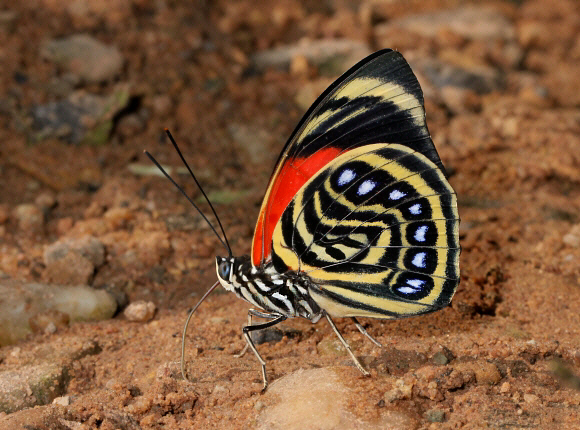 Agrias amydon amydonius, Satipo, Peru – Adrian Hoskins
Agrias amydon amydonius, Satipo, Peru – Adrian Hoskins
Agrias are one of an extremely small number of butterflies which have been known to hybridise with other genera in the wild – a taxon named Prepona x sarumani was described by Smart in 1976, and is considered to be a hybrid between Prepona praeneste abrupta and Agrias claudina lugens. It was captured at Rio Huallaga, Peru. Fruhstorfer recognised the very close relationship between Prepona and Agrias, and some authors e.g. DeVries question whether the 2 genera are distinct. The current taxonomical “bible” – the Atlas of Neotropical Lepidoptera ( Lamas, 2004 ) regards the 2 genera as being distinct, and recognises the hybrid under the name given to it by Smart.
Agrias amydon is distributed from Mexico to Bolivia. The subspecies amydonius is found in central Peru, and in Amazonas state, Brazil.
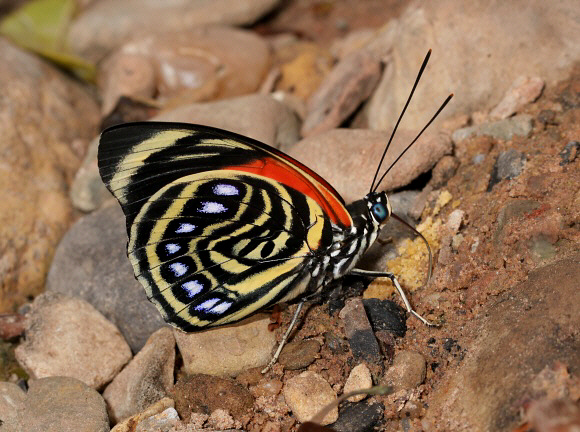 Agrias amydon amydonius, Satipo, Peru – Adrian Hoskins
Agrias amydon amydonius, Satipo, Peru – Adrian Hoskins
Habitats
This species is found in deciduous and evergreen forest at altitudes between about 100-1000m.
Lifecycle
All Agrias sp are thought to feed on Erythroxylum ( Erythroxylaceae ). There are also unconfirmed records of Myrtaceae and Quiinaceae being used. The eggs are smooth and round. They are laid singly on leaves of the foodplants. The larvae are pale brownish, marked with lichen-green spots. They feed nocturnally, and rest by day on twigs. The chrysalis is pale green, rotund, with a dorsal hump, and tapers sharply toward the stout cremaster and the bifid head. It is suspended from a stem or leaf of the foodplant.
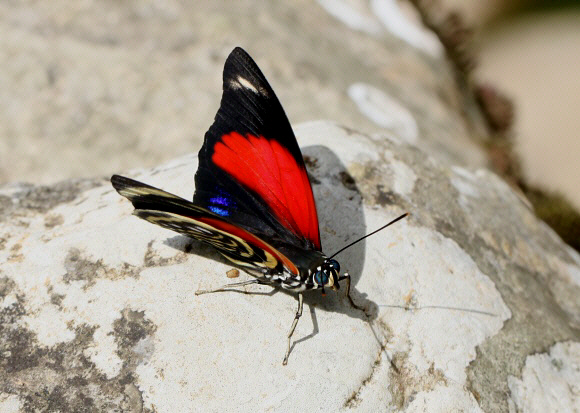 Agrias amydon amydonius, Satipo, Peru – Adrian Hoskins
Agrias amydon amydonius, Satipo, Peru – Adrian Hoskins
Adult behaviour
The butterflies spend most of their lives high in the canopy, and are normally only observed if they are attracted to decomposing fruit, rotting fish, or other bait laid along forest tracks or trails. They are only active in hot conditions, but can be attracted to bait either in sunshine or in shade.
The butterflies always feed and rest with their wings firmly closed, but if disturbed they sometimes give a very rapid flick of the wings, displaying the vivid crimson and blue patches on the glorious upperside.
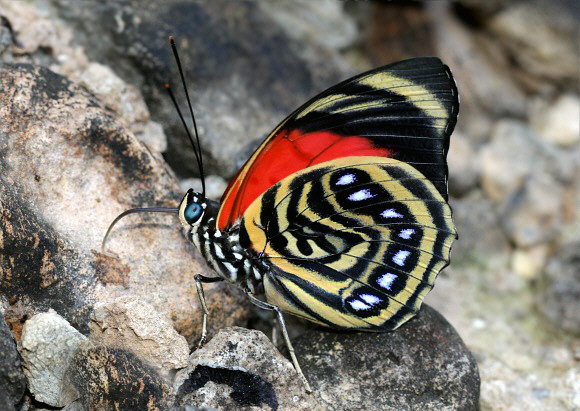
Agrias amydon amydonius, Satipo, Peru – Adrian Hoskins
